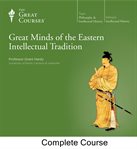Details
PUBLISHED
Made available through hoopla
EDITION
DESCRIPTION
1 online resource (1 audio file (1080 min.)) : digital
ISBN/ISSN
LANGUAGE
NOTES
Lecturer: Grant Hardy
Western philosophy is a vast intellectual tradition, the product of thousands of years of revolutionary thought built up by a rich collection of brilliant minds. But to understand the Western intellectual tradition is to get only half the story. The Eastern intellectual tradition has made just as important a contribution - and is also the product of thousands of years of cumulative thought by a distinct group of brilliant thinkers. Their ideas demonstrate wholly different ways of approaching and solving the same fundamental issues that concerned the West's greatest thinkers, such as the existence of God, the meaning of life and the nature of truth and reality. This epic and comprehensive 36-lecture examination of the East's most influential philosophers and thinkers - from a much-honored teacher and scholar - offers a thought-provoking look at the surprising connections and differences between East and West. By introducing you to the people-including The Buddha, Ashoka, Prince Shotoku, Confucius, and Gandhi - responsible for molding Asian philosophy and for giving birth to a wide variety of spiritual and ideological systems, it will strengthen your knowledge of cultures that play increasingly important roles in our globalized 21st-century world. All Lectures: 1. Life's Great Questions - Asian Perspectives 2. The Vedas and Upanishads - The Beginning 3. Mahavira and Jainism - Extreme Nonviolence 4. The Buddha - The Middle Way 5. The Bhagavad Gita - The Way of Action 6. Confucius - In Praise of Sage-Kings 7. Laozi and Daoism - The Way of Nature 8. The Hundred Schools of Pre-imperial China 9. Mencius and Xunzi - Confucius's Successors 10. Sunzi and Han Feizi - Strategy and Legalism 11. Zarathustra and Mani - Dualistic Religion 12. Kautilya and Ashoka - Buddhism and Empire 13. Ishvarakrishna and Patanjali - Yoga 14. Nagarjuna and Vasubandhu - Buddhist Theories 15. Sima Qian and Ban Zhao - History and Women 16. Dong Zhongshu and Ge Hong - Eclecticism 17. Xuanzang and Chinese Buddhism 18. Prince Shotoku, Lady Murasaki, Sei Shonagon 19. Saicho to Nichiren - Japanese Buddhism 20. Shankara, Ramanuja, Madhva - Hindu Vedanta 21. Al-Biruni - Islam in India 22. Nanak and Sirhindi - Sikhism and Sufism 23. Han Yu to Zhu Xi - Neo-Confucianism 24. Wang Yangming - The Study of Heart-Mind 25. Dogen and Hakuin - Zen Buddhism 26. Zeami and Sen no Rikyu - Japanese Aesthetics 27. Wonhyo to King Sejong - Korean Philosophy 28. Padmasambhava to Tsongkhapa - Tibetan Ideas 29. Science and Technology in Premodern Asia 30. Muhammad Iqbal and Rabindranath Tagore 31. Mohandas Gandhi - Satyagraha, or Soul-Force 32. Fukuzawa Yukichi and Han Yongun 33. Kang Youwei and Hu Shi 34. Sun Yat-sen and Mao Zedong 35. Modern Legacies 36. East and West
Mode of access: World Wide Web







